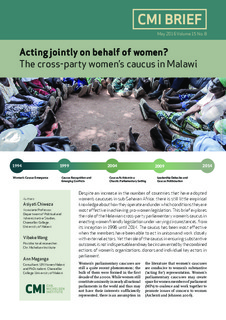Acting jointly on behalf of women? The cross-party women’s caucus in Malawi
Report
Permanent lenke
http://hdl.handle.net/11250/2475211Utgivelsesdato
2016-05-01Metadata
Vis full innførselSamlinger
- Publications [1488]
Originalversjon
Bergen: Chr. Michelsen Institute (CMI Brief vol. 15 no. 8) 4 p.Sammendrag
Despite an increase in the number of countries that have adopted women’s caucuses in sub-Saharan Africa, there is still little empirical knowledge about how they operate and under which conditions they are most effective in achieving pro-women legislation. This brief explores the role of the Malawian cross-party parliamentary women’s caucus in enacting women friendly legislation under varying circumstances, from its inception in 1996 until 2014. The caucus has been most effective when the members have been able to act in unison and work closely with external actors. Yet the role of the caucus in ensuring substantive outcomes is not indispensable and may be circumvented by the combined actions of women’s organizations, donors and individual key actors in parliament.
Authors: Asiyati Chiweza Associate Professor, Department of Political and Administrative Studies, Chancellor College, University of Malawi Vibeke Wang Postdoctoral researcher, Chr. Michelsen Institute Ann Maganga Consultant, UN Women Malawi and PhD student, Chancellor College, University of Malawi Women’s parliamentary caucuses are still a quite recent phenomenon; the bulk of them were formed in the first decade of the 2000s. While women still constitute a minority in nearly all national parliaments in the world and thus may not have their interests sufficiently represented, there is an assumption in the literature that women’s caucuses are conducive to women’s substantive (‘acting for’) representation. Women’s parliamentary caucuses may create space for women members of parliament (MPs) to coalesce and work together to promote issues of concern to women (Archenti and Johnson 2006). The analysis mainly draws on interview data with a total of 49 key informants including MPs, donors, women’s organizations, civil servants, and academics from January 2014 to January 2015.
